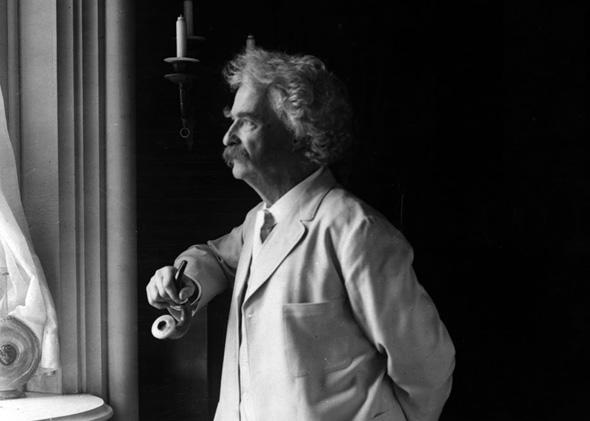There are many pretty and winning things about the human race. It is perhaps the poorest of all the inventions of all the gods, but it has never suspected it once. There is nothing prettier than its naïve and complacent appreciation of itself. It comes out frankly and proclaims, without bashfulness, or any sign of a blush, that it is the noblest work of God. It has had a billion opportunities to know better, but all signs fail with this ass. I could say harsh things about it, but I cannot bring myself to do it—it is like hitting a child.
Man is not to blame for what he is. He didn’t make himself. He has no control over himself. All the control is vested in his temperament—which he did not create—and in the circumstances which hedge him round, from the cradle to the grave, and which he did not devise and cannot change by any act of his will, for the reason that he has no will. He is as purely a piece of automatic mechanism as is a watch, and can no more dictate or influence his actions than can the watch. He is a subject for pity, not blame—and not contempt. He is flung head over heels into this world without ever a chance to decline, and straightway he conceives and accepts the notion that he is in some mysterious way under obligations to the unknown Power that inflicted this outrage upon him—and thenceforth he considers himself responsible to that Power for every act of his life, and punishable for such of his acts as do not meet with the approval of that Power—yet that same man would argue quite differently if a human tyrant should capture him and put chains upon him and make him a slave. He would say that the tyrant had no right to do that; that the tyrant had no right to put commands upon him of any kind, and require obedience; that the tyrant had no right to compel him to commit murder and then put the responsibility for the murder upon him. Man constantly makes a most strange distinction between man and his Maker, in the matter of morals. He requires of his fellow man obedience to a very creditable code of morals, but he observes without shame or disapproval his God’s utter destitution of morals.
God ingeniously contrived man in such a way that he could not escape obedience to the laws of his passions, his appetites, and his various unpleasant and undesirable qualities. God has so contrived him that all his goings out and comings in are beset by traps which he cannot possibly avoid, and which compel him to commit what are called sins—and then God punishes him for doing these very things which from the beginning of time He had always intended that he should do. Man is a machine, and God made it—without invitation from any one. Whoever makes a machine, here below, is responsible for that machine’s performance. No one would think of such a thing as trying to put the responsibility upon the machine itself. We all know perfectly well—though we all conceal it, just as I am doing, until I shall be dead, and out of reach of public opinion—we all know, I say, that God, and God alone, is responsible for every act and word of a human being’s life between cradle and grave. We know it perfectly well. In our secret hearts we haven’t the slightest doubt of it. In our secret hearts we have no hesitation in proclaiming as an unthinking fool anybody who thinks he believes that he is by any possibility capable of committing a sin against God—or who thinks he thinks he is under obligations to God and owes Him thanks, reverence, and worship.
Excerpted from Autobiography of Mark Twain, Volume 2© 2001 by the Mark Twain Foundation. All Rights Reserved. Transcription, reconstruction, and emendation © 2013 by The Regents of the University of California. Reprinted by permission of University of California Press on behalf of the Mark Twain Foundation.
